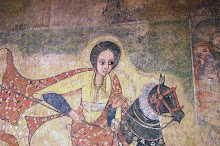
A recent article reminded me of a conversation I once had with a curious man I used to see at the gym...
It was in the summer of 2006. I had devised a brilliant plan to regularly go to the gym in the middle of the night. I thought it was brilliant because I could avoid the afterwork/evening gym crowd, the traffic and the summer heat. Among the very few patrons who frequented the establishment included a short, stocky man in his mid-forties with a quiet demeanor and a serious disposition. The first time he spoke to me was to ask how old I was. I thought it was a strange question but I replied. He laughed at my answer thinking I was joking because he said I looked very young. On my part, I was surprised he spoke English without any foreign accent because I assumed he was an East Indian. So I ventured with a question that seemed very mundane:
Mi: Where are you from?
Man: Some city, U.S.A (I forgot which city he said)
Mi: Oh! I thought you were from India.
Man (shaking his head): I am White!
Mi (eyes wide-open): White?
Man (hesitantly): ...I am a Gypsy...
Mi (blank stare): Gypsy?
Man: ... but don't tell people that...
Mi (surprised): Why not?!
Man (lowering his voice): People don't like Gypsies... I don't like to tell people... When people find that out, I have to relocate...
Mi: What?... I am sure there are many Gypsies...You know Cher is a Gypsy...
Man: Is She?
Mi: I think so...
The conversation ended as strangely as it began. That night, on my drive home, I felt some remorse for letting my curiosity broach a sensitive issue. When I arrived home, I could not wait to check on the dictionary what a Gypsy was. What did I not understand? My earliest and only clear reference to a Gypsy was La Esmeralda from Victor Hugo's Notre Dame de Paris. It was odd that the only thing I remembered about that character was the mystique that surrounded her and others' contempt toward her.
The American Heritage dictionary defined the word 'Gypsy' as follows:
It was in the summer of 2006. I had devised a brilliant plan to regularly go to the gym in the middle of the night. I thought it was brilliant because I could avoid the afterwork/evening gym crowd, the traffic and the summer heat. Among the very few patrons who frequented the establishment included a short, stocky man in his mid-forties with a quiet demeanor and a serious disposition. The first time he spoke to me was to ask how old I was. I thought it was a strange question but I replied. He laughed at my answer thinking I was joking because he said I looked very young. On my part, I was surprised he spoke English without any foreign accent because I assumed he was an East Indian. So I ventured with a question that seemed very mundane:
Mi: Where are you from?
Man: Some city, U.S.A (I forgot which city he said)
Mi: Oh! I thought you were from India.
Man (shaking his head): I am White!
Mi (eyes wide-open): White?
Man (hesitantly): ...I am a Gypsy...
Mi (blank stare): Gypsy?
Man: ... but don't tell people that...
Mi (surprised): Why not?!
Man (lowering his voice): People don't like Gypsies... I don't like to tell people... When people find that out, I have to relocate...
Mi: What?... I am sure there are many Gypsies...You know Cher is a Gypsy...
Man: Is She?
Mi: I think so...
The conversation ended as strangely as it began. That night, on my drive home, I felt some remorse for letting my curiosity broach a sensitive issue. When I arrived home, I could not wait to check on the dictionary what a Gypsy was. What did I not understand? My earliest and only clear reference to a Gypsy was La Esmeralda from Victor Hugo's Notre Dame de Paris. It was odd that the only thing I remembered about that character was the mystique that surrounded her and others' contempt toward her.
The American Heritage dictionary defined the word 'Gypsy' as follows:
1. One of a nomadic Caucasoid people originally migrating from the border region between Iran and India to Europe in the 14th or 15th century and now living principally in Europe and the United States. 2. Romany (sense 2). 3. gypsy. One that resembles a Gypsy in appearance or behavior [Shortening and alteration of Egyptian.]
Upon reading that, I was a little bit relieved. At least, I was not completely wrong. Somehow, the conversation left me uneasy, yet piqued my interest to know more about gypsies... their culture... their history... They have been on the news recently... Had it not been for that conversation, I would not have paid attention to their story. This time, I understood what the man was trying to tell me... Cheers for random conversations!
"There is no such thing as a worthless conversation provided you know what to listen for. And questions are the breath of life for a conversation" - James Nathan Miller
Photo: Gypsy Art Image

Bonjour Mi,
ReplyDeleteJe vous ai écrit un message hier, mais apparemment il n'est pas passé. Je voulais vous dire que sur les Gypsies, vous m'avez donné l'idée d'écrire un article et surtout de rendre compte de la musique de ces peuples itinérants de l'Europe. Je suis heureux de voir qu'on se préoccupe un peu partout des Roms et je dois dire que j'ai honte de ce qu'on leur fait en France.
La politique de Sarkozy est un vrai scandale elle est l'expression même d'un racisme très ancré dans la culture de ceux qui ne veulent pas de l'Etranger, alors qu'on est toujours l'étranger de quelqu'un... et tout cela pour essayer de gagner les prochaines élections. C'est bien mal parti !